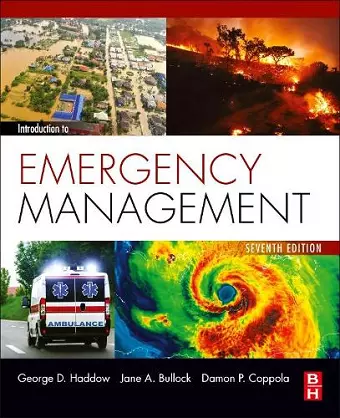Introduction to Emergency Management
George Haddow author Jane Bullock author Damon Coppola author
Format:Paperback
Publisher:Elsevier - Health Sciences Division
Published:17th Apr '20
Should be back in stock very soon

Introduction to Emergency Management, Seventh Edition, sets the standard for excellence in the field and has educated a generation of emergency managers. This long-trusted resource provides a broad overview of the key aspects of the emergency management profession. Readers will gain an understanding of why the emergency management profession exists, what actions its professionals and practitioners are tasked with performing, and what achievements are sought through the conduct of these various efforts. Students and new professionals alike will further gain an enhanced understanding of key terminology and concepts that enable them to work with emergency management specialists.
"The goal of risk management is to reduce risk—not to an unrealistic zero, but to an acceptable level. In the absence of critical thinking, fear-based decision making may occur. The seventh edition of Introduction to Emergency Management can help point the way to better risk decisions. Those responsible for emergency management are expected to manage crises quickly and efficiently, from planning to recovery. The COVID-19 pandemic is a good example, illustrating how an unexpected threat changed the way business is done throughout the world. Readers of this book will learn about the emergency management process, the tools to establish and manage crises, and what is and is not realistic. For students, the book includes a staggering amount of introductory information with plenty of detail—enough for various instructors to pick and choose what to focus on when presenting the material. Learning objectives, case studies, critical thinking questions, class exercises, additional references, and points of research enable learning. For the emergency planner, the book details the classic emergency management process of hazard identification via risk assessment and provides information on the mitigation, preparedness, response, and recovery stages. For the responder, discussions of the incident command system, communication (including social media), leadership, critical thinking, and partnering with the media will be useful. Contents are laid out in a logical manner, but the reader can also jump to one of the self-contained chapters. While most of the book has an American viewpoint, it does include occasional references to non-U.S. events, as well as a chapter on international disaster management. This book has almost everything a reader could want to know about the emergency management process." --Security Management
ISBN: 9780128171394
Dimensions: unknown
Weight: 1130g
560 pages
7th edition